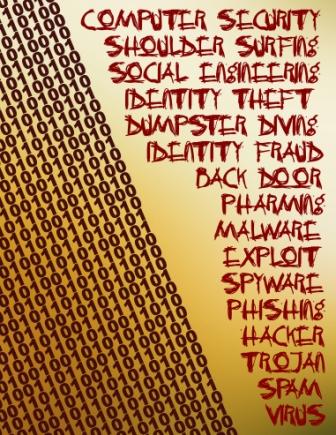|
Great Security is the Achilles heel of malicious code writers
Malicious code is any deliberately coded program, including macro and scripts, that causes an unwanted or unexpected event on an individual's computer. These malware codes vary and run the gambit from viruses, spyware, phishing, worms, keyloggers, and spam to a host of other malware. Cybercriminals, malicious code writers, and the Internet are constantly changing. We will witness a (r)evolution in a host of new services. Google has already provided or contributed to many of them, including "Web 2.0". Services like the one I'm currently using to provide this web site, which provides all the necessary software using a web based service without software downloads, is a small insight into what is coming.
Now, go back to the early Internet days. WOW! Maybe less than 15 years ago, actually less for the point I'm trying to make, an infected computer with a malicious code (a virus) would have been a lot less critical or fatal. The abundance and complexity of malware today trying to invade our computers, however, makes serious or fatal infections of our computers more likely. The history of and what is a virus? Maybe it's all relative anyway. The holes in the system were just bigger then, with fewer malicious codes trying to penetrate your computer. Today, it's just more technologically advanced codes attacking our PCs, but with smaller holes. Either way it's a threat which will be as constant as day and night and it's a challenge to all of us. Very few connected to the Internet have any insurance or assurance that they are protected. The stakes are high; entire family fortunes have been zapped in seconds and identities have been destroyed with the burden of identity restoration left for the victims to repair. Don't become a victim of Identity Theft. Take action, get great security, and become a responsible cybercitizen and learn more about "managed security services". To give you an idea how insidious spyware has become, PC users trying to use Internet search engines have been thwarted by spyware that prevents them from locating a cure or patch for their infected computers. Inability to locate a cure allows for the spyware infections to proliferate more readily among consumers. Learn more about spyware. The Trojan.URDVXC, a modern day worm first seen on January 4th, 2007, can generate as much as a 1,000 randomly named files on an infected users PC within seconds. It still exists in the wild and logged 350,000 file names within the first 24 hours of its existance. Learn more about worms. In September 2006, the worm known as "Stration" was sent out originally as eight slightly different variations. The Stration virus contained malicious code that opened a "back door" into infected computers, enabling virus writers to take over the infected computers. Don't let your computers become "Zombies" under the control of hackers. Hackers writing malicious codes today are not so much interested in crashing your computer as they are in stealing personal and confidential information. The hacker will use your computer as a platform to send spam, viruses, and pornography (including being sent to your email lists). These hackers or cybercriminals will herd as many infected computers as possible, called "botnets" or "bot networks", which are then made available for resale to organized crime or to the black market. Don't let your computer become a zombie and part of a "botnet". |






